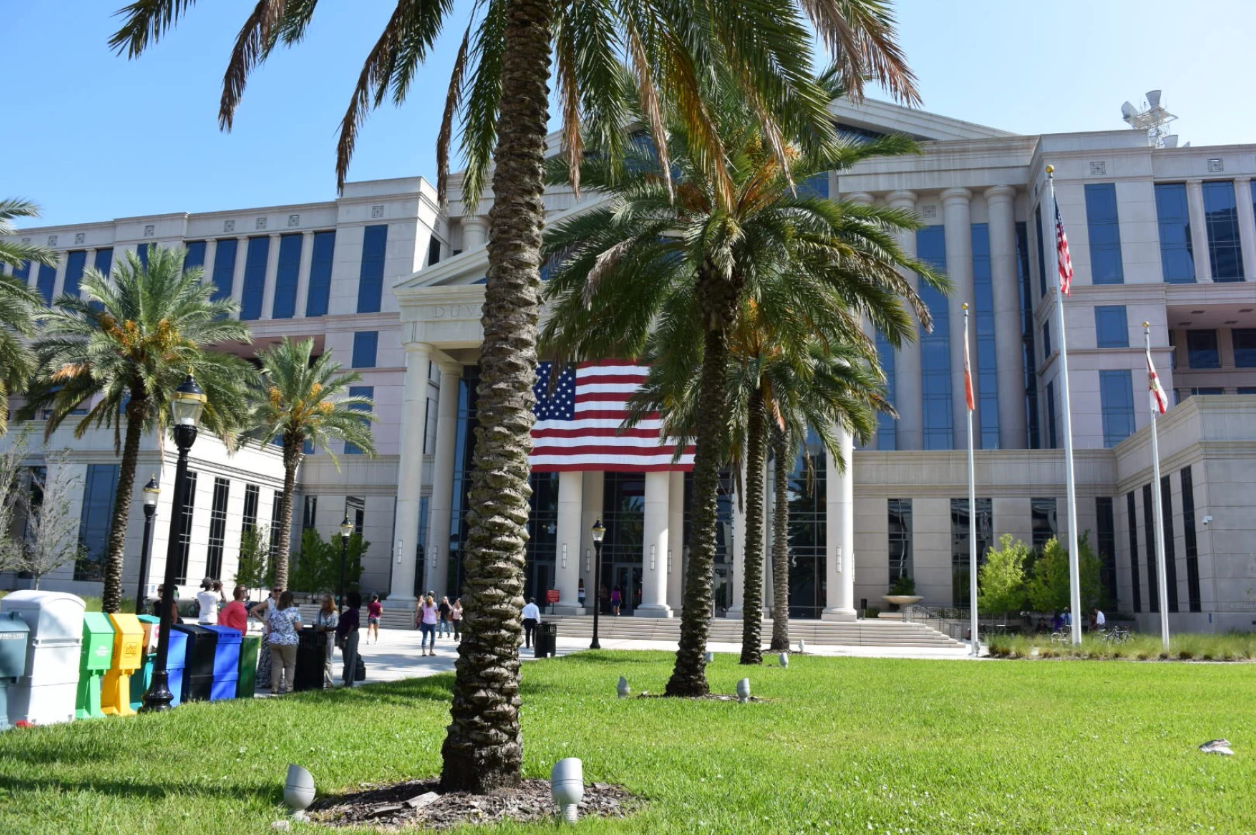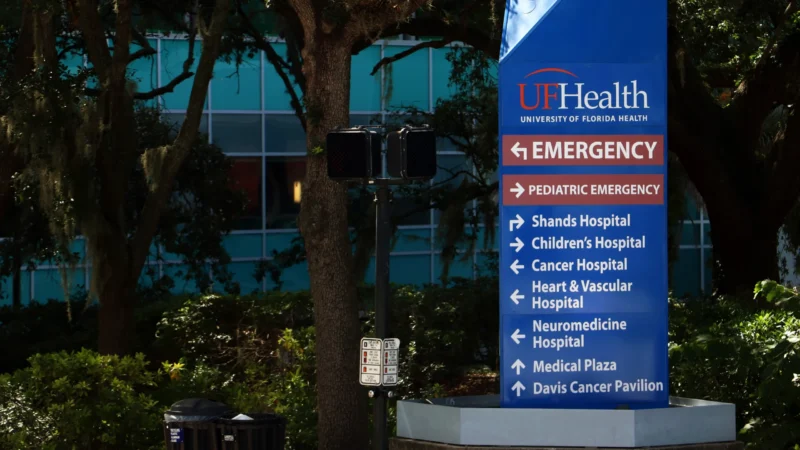A public records activist from Jacksonville who sued county prosecutors could face a six-figure bill in a case that may redefine the landscape of open records litigation in the Sunshine State.
Curtis Lee, 67, sued the 4th Judicial Circuit State Attorney’s Office in 2020 for alleged violations of public records laws. Not only did he lose his case, but he now faces the prospect of paying the agency’s legal bills, a sum the state says exceeds $130,000.
This case represents one of the first major tests of a 2017 amendment to Florida’s public records laws. That amendment allows government agencies to seek reimbursement for legal costs if they can prove a records request or lawsuit was made for “an improper purpose.”
The outcome of Lee’s case could set a precedent that shapes how public records laws are interpreted and enforced across Florida, potentially discouraging future records lawsuits, advocates warn.
Why Lee sued
Lee’s lawsuit alleged the State Attorney’s Office had unreasonably delayed records and used unexplained acronyms, rendering them unintelligible. He also focused much of his complaint around new procedures surrounding public records, specifically the introduction of a tiered fee system.
The office had begun charging different hourly rates for the cost of employees reviewing and redacting records. That means a request that will take more time also comes with a higher hourly rate.
When Lee received an invoice for the new higher rate, he requested documents that “verify or justify” the fees. Although he received some, he believed the office was refusing to give over others. He later testified that he had expected, but never received, calculations for employees’ salary and benefits to justify why the costs had increased.
During the lawsuit’s discovery, the state did give Lee two more documents: one was a previous public records policy and the other was an email discussing adding a third, more expensive tier for requests.
Despite that, 7th Judicial Circuit Judge Kathryn Weston ruled in favor of the State Attorney’s Office. The new documents did not prove a violation of the public records law because, Weston said, the email was not “responsive” to his request. The policy, she noted, was outdated, and he was not charged the rate discussed in the email.
“Plaintiffs request to ‘verify and justify’ is indisputably vague, leaving the (State Attorney’s Office) to attempt to interpret what Plaintiff was requesting,” she wrote in her order. “One cannot assert a vague response under the Public Records Act, then subsequently modify and clarify it, and claim that the responsive entity should have known what was intended in the original request.”
This meant that not only would Lee not be eligible to recover his attorneys fees from the State Attorney’s Office, but under the recently amended Florida Statute 119.12(3), the agency could try to prove his lawsuit was frivolous and seek attorneys fees from him instead.
In a hearing Tuesday, lawyers for the State Attorney’s Office did exactly that.
The hearing
First Assistant State Attorney Stephen Siegel testified the office had spent more than $180,000 in taxpayer money over the course of the suit. Of that, the office was demanding Lee pay about $130,000 at the hearing.
The office’s lawyers conceded some of its calculations were incorrect, and they also said they would seek additional fees for an expert witness who testified at the hearing.
If Weston rules that Lee’s lawsuit was made for an improper purpose, she will decide how much money he must pay.
The statute says an improper purpose includes records requests or lawsuits intended primarily to cause a violation of the law or “for a frivolous purpose,” which it does not define.
Lee’s lawyer, Jennifer Mansfield, argued the statute was amended with the intent of being applied very narrowly to a specific set of “gotcha cases.” These cases involve people submitting intentionally complicated or large public records requests to agencies, then immediately suing them to win back their attorneys fees.
Lee’s past records requests and lawsuits came up in court repeatedly.
Outside of this case, he has filed six lawsuits, losing only once. Even when he won, he said on the stand, he collected only part or all of his attorneys fees, with the exception of one time when he got to keep the interest that a judgment collected while it stalled for six years.
“It was impossible for me to make money on this,” Lee said. “All the time I’ve spent, I’ve gotten zero dollars.”
Lee’s successful public records and open-meetings lawsuits have made a significant impact in Northeast Florida. One lawsuit ended a 30-year pension agreement with police and firefighters that had been negotiated behind closed doors. Another forced the State Attorney’s Office to accept cash as payment for records.
Regardless of his past successes, attorneys representing the prosecutors office maintained that Lee’s lawsuit met the criteria for an improper purpose. They argued that his requests and his persistence in litigation, even after other parts of his case were dismissed, demonstrate an intent to burden the office rather than a legitimate pursuit of public records.
“Plaintiff’s goal was not to request public records but to serve his own political ends,” the State Attorney’s Office argued in its motion for attorneys fees.
University of Florida journalism professor Ted Bridis, an expert witness for Lee, warned of the potential chilling effect if the judge requires Lee to pay the State Attorney’s Office.
“It’s a dangerous precedent affecting journalists, affecting news organizations, affecting public interest groups,” Bridis said on the stand Tuesday. “It’s going to restrict public records litigation to wealthy plaintiffs who can afford to do this and face the risk.”
Lee and his lawyer pointed to previous times he had worked with the State Attorney’s Office to correct what he saw as problems with their public records without resorting to a lawsuit as proof he wasn’t rushing to sue for an improper purpose.
“I don’t like suing,” he said on the stand. But, he said, he genuinely was trying to decode acronyms the office used in its documents.
When Lee’s partner of 37 years died of cancer during the lawsuit, he said, he lost interest in the case and offered to drop it, even though it would have meant he had to pay his attorney for the about $12,000 already sunk into the case. But the State Attorney’s Office wouldn’t let him. While Lee could dismiss his claims, the office wouldn’t agree to stop pursuing attorneys fees sanctions, effectively preventing him from ending the legal battle entirely.
The State Attorney’s Office had warned him they would ask the court to make him cover attorneys fees if he chose to sue, and now if he wanted to walk away from that lawsuit, State Attorney Melissa Nelson’s lawyers demanded Lee pay her office $30,000.
Judge Weston asked if Lee’s willingness to drop the lawsuit was proof that his litigation had been frivolous.
Earlier, Lee tried to rebut that argument, saying he was going through a normal response to losing a loved one. The offer to settle, he said, was sincere, but the state didn’t respond for months.
“You didn’t do anything about it for four or five months,” he said. “So you were diddling me while I was grieving. You were not nice people. And then you’re asking me, under those circumstances, to just drop my suit and hope upon hope that you won’t come after me with both guns blazing.”
The State Attorney’s Office’s lawyer, Michael Lockamy of the Bedell law firm, pointed out Lee did not request records as part of the settlement offer.
“We believe he has filed this for a frivolous purpose,” Lockamy said. “It was frivolous from the beginning, and he had no legitimate purpose.” The State Attorney’s Office, Lockamy argued, “went to extraordinary lengths to try to avoid this.”
Lockamy also argued that because office employees had already told Lee that some of the requested records did not exist, his lawsuit was improper. A requestor first needs a good-faith basis that the records exist before suing, Lockamy said.
The problem with that, Bridis responded, is that the people most likely to request records are also most likely to be skeptical of their government.
“People who are in the requester community — journalists, activists, public interest groups — we are naturally, inherently suspicious,” Bridis said. “We naturally have an adversarial relationship with government agencies, and so we don’t necessarily take at face value” an agency’s claim that records don’t exist.
‘Chilling and dangerous’
Only one other case, Vitale v. Palmetto Charter School out of Manatee County, appears to have been litigated under the 2017 amendment. In that case, a parent was ordered to pay legal fees after filing large public records requests with the school’s board members and demanding rapid responses. He requested records, including emails he sent, that he already had.
An appellate court said it could not rule on whether that constituted an improper purpose until after the trial judge determines how much Vitale will have to pay in attorneys fees.
Florida has long held a reputation as the leading state on open access to government records. If the courts decide Vitale’s and Lee’s requests violate the law, those rulings could broaden a new power government agencies wield to go after those requestors deemed illegitimate.
At one point, the judge asked Bridis if forcing Lee to pay might encourage future requestors to try to resolve their problems without suing.
“Not necessarily,” Bridis said. In some cases, an office claims it doesn’t have records because the custodian didn’t search for it in the right way. “That gets litigated. That’s what lawsuits are for.”
David Cuillier, the director of the Brechner Freedom of Information Project at the University of Florida, said forcing Lee to pay would have a “really chilling and dangerous” effect.
“If you’re seeking records from the government, you usually have really good intentions and really want to know what the government is doing,” said Cuillier, who also serves on the Federal Freedom of Information Act Advisory Committee. “People who are willing to fight for those records may now think twice before doing so.”
He said an overzealous desire by the government to weaponize the amendment would punish “curious and dogged” citizens.
“People shouldn’t have to pay for being passionate,” he said. “It’s a slippery slope. One person’s frivolousness is another’s hardworking journalist or citizen who wants to make the world a better place.”
Bea Lunardini is investigative reporting fellow at The Tributary. She has previously covered crime and courts in Georgia, Texas and Florida. She is a senior journalism student at the University of Florida. You can reach Bea at bea.lunardini@jaxtrib.org.
This story is published through a partnership between Jacksonville Today and The Tributary.
Disclosure: Jennifer Mansfield, who represents Curtis Lee in this case, is a member of The Tributary’s board of directors and a financial supporter of The Tributary. Three lawyers at the Bedell law firm, which represents the State Attorney’s Office in this case, are also financial supporters of The Tributary.







